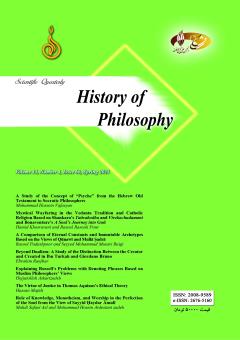Role of Knowledge, Monotheism, and Worship in the Perfection of the Soul from the View of Sayyid Ḥaydar Āmulī
Subject Areas : Geneology of philosophical schools and Ideas
Mahdi Safaei Asl
1
![]() ,
Mohammad Hosein Ardestanizadeh
2
*
,
Mohammad Hosein Ardestanizadeh
2
*
1 - Assistant Professor, Islamic Philosophy and Kalam Department, College of Farabi, University of Tehran, Qom, Iran
2 - PhD Candidate, University of Religions and Denominations, Qom, Iran
Keywords: Perfection, soul, Knowledge, monotheism, Worship, Sayyid Ḥaydar Āmulī,
Abstract :
The perfection of the soul is one of the most important and complex issues related to resurrection. Some thinkers oppose it, while many others have adduced certain arguments and narrative evidence to demonstrate it. Sayyid Ḥaydar Āmulī is among the gnostics who believe in the perfection of the soul. The present study, following a descriptive-analytical method, addresses three factors (knowledge, monotheism, and worship) contributing to the perfection of the soul. According to Sayyid Ḥaydar Āmulī, true knowledge leads to the perfection of the soul and, by knowing oneself, Man attains a deep understanding of their Creator. Monotheism and intimacy with God Almighty also lead to human growth and leaving the natural world, to the extent that Man sees no veil between themselves and their God, and attains a station that even the closest angels to Him have not experienced. Worship, as stated by Sayyid Ḥaydar Āmulī, polishes the human soul and removes its impurities to the point where it achieves the station of annihilation and subsistence in God. Gnostics consider this station the highest level of human perfection.
قرآن کریم.
آملی، سیدحیدر (1383) أنوار الحقیقة و أطوار الطریقة و أسرار الشریعة، شرح محسن موسوی تبریزی، قم: نور علی نور.
آملی، سیدحیدر (1385) المحیط الأعظم و البحر الخضم فی تأویل کتاب الله العزیز المحکم، تحقیق محسن موسوی تبریزی، قم: نور علی نور.
آملی، سیدحیدر (1394) نص النصوص فی شرح الفصوص لمحییالدین ابن عربی، تصحیح محسن بیدارفر، قم: بیدار.
آملی، سیدحیدر (1426ق) جامع الأسرار و منبع الأنوار، تصحیح هانری کربن، بیروت: مؤسسة التاریخ العربی.
ابدالی، محمد؛ نوروزی، رضا؛ نقیپورفر (1401) «تأثیر عبادت در تکامل انسان از منظر حکمت متعالیه با تاکید بر آراء ملاصدرا»، انسانپژوهشی دینی، شمارۀ 48، ص118ـ99.
ابنسینا (1363) المبدأ و المعاد، تصحیح عبدالله نورانی، تهران: مؤسسة مطالعات اسلامی دانشگاه مکگیل.
ابن¬منظور، محمدبن مكرم (1414ق) لسان العرب، تصحیح جمالالدین میردامادی، بیروت: دار صادر.
حمزئیان، عظیم؛ سنایی، علی؛ رشیدینسب، طوبی (1394) «بررسی توحید از نظر سیدحیدر آملی و امام خمینی»، پژوهشنامه کلام، شمارۀ 3، ص106ـ89.
خادمی، عیناله؛ صلواتی، عبداله؛ پوراکبر لیلا (1393) «علم انسان کامل از دیدگاه سیدحیدر آملی»، ادیان و عرفان، دورۀ 47، شمارۀ 2، ص280ـ255.
رازی، فخرالدین محمد (بیتا) التفسیر الکبیر، تهران: دار الکتب العلمیه.
راغب اصفهانی، حسينبن محمد (1412ق) مفردات ألفاظ القرآن، بیروت: دار القلم.
سهروردی، شهابالدین یحیی (1380) مجموعه مصنفات شیخ¬اشراق، تهران: پژوهشگاه علوم انسانی و مطالعات فرهنگی.
قدسی، اکرم؛ عبدی، رقیه (1398) «مراتب نماز از منظر سیدحیدر آملی و مقایسه آن در روایات اهل بیت علیهم السلام»، ارائه شده در اولین کنفرانس بینالمللی دین، معنویت و کیفیت زندگی، مشهد: سازمان بينالمللي مطالعات دانشگاهي.
کراجکی، محمدبن علی (1410ق) کنز الفوائد، تصحیح، عبدالله نعمه، قم: دار الذخائر.
مرتضینژاد، معین (1400) مبانی وجودشناختی، معرفت¬شناختی و روششناختی سیدحیدر آملی در بحث از توحید، پایاننامه کارشناسی ارشد الهیات و معارف اسلامی، دانشگاه شهید بهشتی.
ملاصدرا (1383الف) الحکمة المتعالیة فی الأسفار الأربعة، ج3، تصحیح و تحقیق مقصود محمدی، تهران: بنیاد حکمت اسلامی صدرا.
ملاصدرا (1383ب) الحکمة المتعالیة فی الأسفار الأربعة، ج8، تصحیح و تحقیق علی اکبر رشاد، تهران: بنیاد حکمت اسلامی صدرا.

